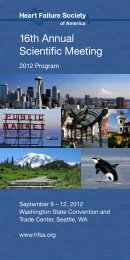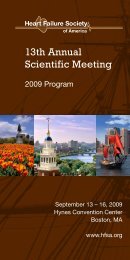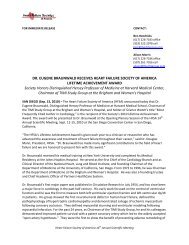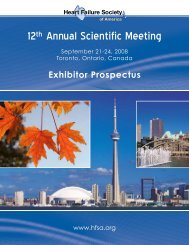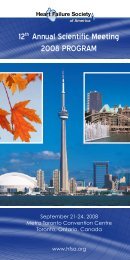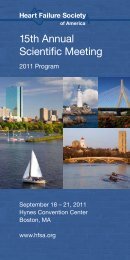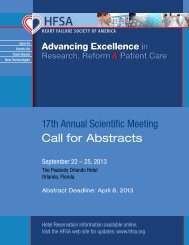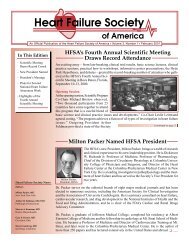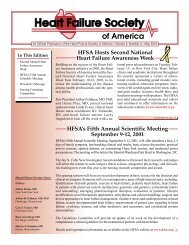Kanu Chatterjee Receives 2009 HFSA Lifetime Achievement Award ...
Kanu Chatterjee Receives 2009 HFSA Lifetime Achievement Award ...
Kanu Chatterjee Receives 2009 HFSA Lifetime Achievement Award ...
You also want an ePaper? Increase the reach of your titles
YUMPU automatically turns print PDFs into web optimized ePapers that Google loves.
Heart Failure Society News December <strong>2009</strong><br />
Pivotal Clinical Trials Should only be<br />
done in North America<br />
In the first debate Robert M. Califf (Durham,<br />
NC) and Karl Swedberg (Göteborg, Sweden)<br />
presented arguments for and against doing<br />
clinical trials only in North America. Dr.<br />
Califf reframed the question to the broader<br />
one of whether clinical trials “should<br />
include adequate numbers of U.S. patients.”<br />
He noted that a review of outcomes in<br />
cardiovascular drug trials over the last 10<br />
years found that in 13 of the 15 trials the<br />
results in the U.S. varied significantly from<br />
those in the rest of the world. The question is<br />
how we handle regional differences.<br />
Dr. Swedberg questioned the existence of<br />
regional variations. Major trials of ACEinhibitors<br />
post-MI performed in several<br />
European countries and in North America<br />
and primary prevention statin trials done in<br />
Europe and North America show consistent<br />
results. In general, trials done properly<br />
will show similar benefits across regions.<br />
Pivotal trials should include a broad patient<br />
population.<br />
2010 <strong>HFSA</strong> RESEARCH<br />
FELLOWSHIPS<br />
The purpose of the research fellowship<br />
is to develop clinician-investigators in<br />
the field of heart failure.<br />
APPLICATIONS AVAILABLE ON-LINE<br />
2010 Research Fellowship Application<br />
Receipt Deadline:<br />
Monday, February 1, 2010<br />
Debates<br />
Clinical Trials Should be Conducted in<br />
Targeted Populations<br />
In the second debate, Clyde W. Yancy (Dallas,<br />
TX) and Milton Packer (Dallas, TX) debated<br />
the question of whether clinical trials should be<br />
conducted in targeted populations. Dr. Yancy<br />
argued that in the case of certain groups and<br />
certain disease states, heart failure being one,<br />
the differences between groups must be taken<br />
into account. National health statistics illustrate<br />
differences in the cardiovascular disease<br />
burden according to age, gender, and race. He<br />
also noted that randomized controlled trials<br />
do not include a representative sample of the<br />
U.S. population. How can we accept the results<br />
of trials targeting high-risk hypertensives<br />
with a low percentage of African Americans<br />
participating, when it is clear that African<br />
Americans are at higher risk of developing<br />
hypertension?<br />
Dr. Packer argued that sub-group analyses<br />
are not reliable. V-HeFT reduced mortality<br />
in all patients. Some researchers thought<br />
race merited a closer look and initiated<br />
the A-HeFT trial to confirm the sub-group<br />
analysis. When data from both trials<br />
are considered, it appears that the drug<br />
combination works even better in white<br />
patients than in African Americans. Dr. Packer<br />
concluded that a stratified approach including<br />
all populations should be used in designing a<br />
randomized clinical trial.<br />
<strong>HFSA</strong> CME Board Review Course<br />
for ABIM 2010 Certifying Exam:<br />
Advanced HF/Transplant Cardiology<br />
October 1-3, 2010<br />
Minneapolis Airport Marriott,<br />
Bloomington, MN<br />
Addressing Arrhythmias in Heart Failure<br />
The first speaker of the session was Sanjiv M.<br />
Narayan (San Diego, CA) who addressed the<br />
changing epidemiology of atrial fibrillation<br />
(AF) and sudden cardiac death (SCD) in<br />
relation to heart failure. AF complicates the<br />
treatment of heart failure, and the combination<br />
of both disorders is particularly detrimental,<br />
leading to substantially increased mortality.<br />
Obesity will be an increasingly important<br />
etiology for AF. Studies show falling trends in<br />
the stroke rate for patients with AF, consistent<br />
with the general decrease in stroke rates and the<br />
increased use of warfarin, but the treatment of<br />
patients with AF remains sub-optimal.<br />
William G. Stevenson (Boston, MA) focused<br />
the issue of medication efficacy in the treatment<br />
of AF in heart failure patients. Warfarin is the<br />
standard of care. The importance of rate control<br />
cannot be overemphasized. It normally takes a<br />
number of drugs to achieve that goal, with beta<br />
blockers commonly combined with digoxin.<br />
Recent studies have demonstrated no differences<br />
between rhythm control and rate control.<br />
Therefore, routine attempts to maintain sinus<br />
rhythm are not warranted. However, if a patient<br />
is symptomatic, and rate control is difficult, it is<br />
reasonable to consider a rhythm control strategy.<br />
Bruce L. Wilkoff (Cleveland, OH) addressed<br />
ICD therapy as long-term strategy. ICD<br />
therapy prolongs patients’ live an average of<br />
1.2 years over 8 years. ICD therapy can be<br />
improved by using AAI mode for ventricular<br />
backup pacing, because right ventricular<br />
pacing has been shown to increase mortality.<br />
Reducing shocks by using antitachycardia<br />
pacing and other discriminators is another<br />
way to improve ICD therapy.<br />
Vivek Y. Reddy (New York, NY) rounded<br />
out the session with a talk on the application<br />
of ablation for ventricular tachyarrhythmia<br />
(VT) in ICD patients. Clinical efficacy data<br />
for VT ablation are limited. Most studies are<br />
single-center. Based on the data available, the<br />
procedure appears quite safe and effective.<br />
We should consider whether ICD patients at<br />
high risk of shock should undergo VT ablation<br />
to reduce the incidence of shock and prevent<br />
ICD storms.<br />
5



